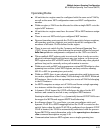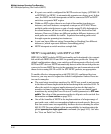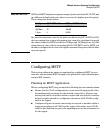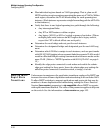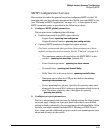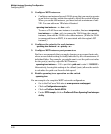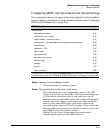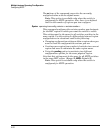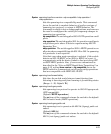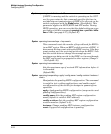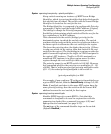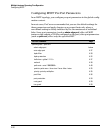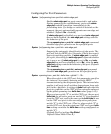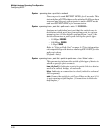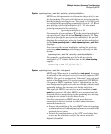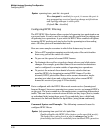
Multiple Instance Spanning-Tree Operation
Configuring MSTP
Syntax: spanning-tree force-version < stp-compatible | rstp-operation |
mstp-operation >
Sets the spanning-tree compatibility mode. This command
forces the switch to emulate behavior of earlier versions of
spanning tree protocol, or return to MSTP behavior. The
command is useful in test or debug applications, and removes
the need to reconfigure the switch for temporary changes in
spanning-tree operation.
stp-compatible: The switch applies 802.1D STP operation on all
ports.
rstp-operation: The switch applies 802.1w operation on all ports
except those ports where it detects a system using 802.1D
Spanning Tree.
mstp-operation: The switch applies 802.1s MSTP operation on
all ports where compatibility with 802.1D or 802.1w spanning
tree protocols is not required.
Note that even when mstp-operation is selected, if the switch
detects an 802.1D BPDU or an 802.1w BPDU on a port, it
communicates with the device linked to that port using STP
or RSTP BPDU packets. Also, if errors are encountered as
described in the “Note on MSTP Rapid State Transitions” on
page 4-18, setting force-version to stp-compatible forces the
MSTP switch to communicate out all ports using operations
that are compatible with IEEE 802.1D STP.
Syntax: spanning-tree forward-delay
Sets time the switch waits between transitioning from
listening to learning and from learning to forwarding states.
(Range: 4 - 30; Default: 15.)
Syntax: spanning-tree legacy-mode
Sets spanning-tree protocol to operate in 802.1D legacy mode
(STP-compatible).
(Default: MSTP-operation.)
The no form of the command returns the switch to the default
802.1s native mode (MSTP-operation).
Syntax: spanning-tree legacy-path-cost
Sets spanning-tree to operate with 802.1d (legacy) path cost
values.
(Default: 802.1t.)
The no form of the command returns the switch to the default
802.1t (not legacy) path cost values.
4-23



